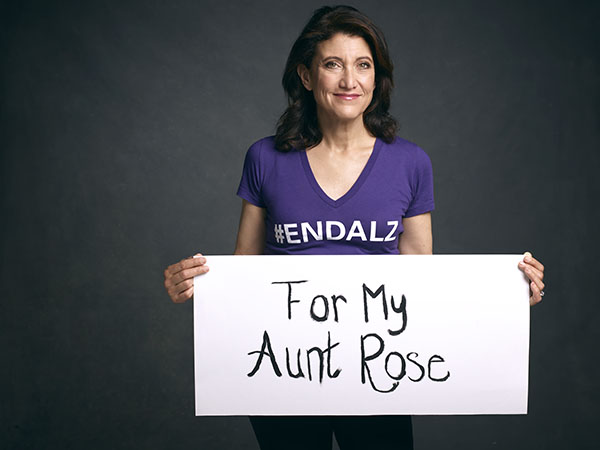Amy Aquino first encountered dementia when she was a kid. “I had 11 aunts and uncles on my father’s side, and about half of them had Alzheimer’s or another form of dementia, so it became part of my life early on,” said the TV, screen and stage actress.
Amy’s Aunt Rose, who taught her how to garden, was “smart, curious, interested and active, like all dad’s siblings,” but started acting a little strangely when she was in her late 50s. Her odd behavior continued for about five years, when the family began to see big changes. “She lived alone, and we’d get calls from one of her daughters that she was missing. My father would jump in the car to look for her,” Amy remembers vividly.

Aunt Rose was too young to be considered “senile,” the term that was used back in the 70s when our grandparents would become forgetful. “Everyone was completely bewildered and struggling to find out what was going on. Aunt Rose was perfectly healthy, perfectly smart, and never suffered mental illness. But, she was acting like a mentally ill person,” Amy says. Rose’s behavior, however, didn’t have a name at the time, and her family tried everything to help her, from changing her diet to hiring a caregiver. “They were afraid she was going to get hurt,” Amy explains. “It was difficult to comprehend and accept. It was very, very painful. Watching Aunt Rose lose her life was shocking and difficult to accept.”
Later on, Amy’s uncle Mike developed memory and cognitive issues in his early 70s, but by then his condition had a name: Alzheimer’s Disease. “Uncle Mike was a physically healthy man who had traveled all over the world. His brain simply stopped functioning the way it should. He could no longer perform daily tasks. He didn’t recognize people,” Amy says.
When Aunt Florence, a third sibling of Amy’s dad, developed Alzheimer’s in her 80s, she never accepted that her brain wasn’t functioning properly, and she fought it. “It became extremely painful for my cousin Katherine, who was Florence’s caregiver,” Amy recalls. Eventually, Florence had to “be tricked” into being moved to a facility that could properly care for her.
After witnessing Alzheimer’s rob the identities from her loved ones, Amy partnered with the Alzheimer’s Association, during Alzheimer’s and Brain Awareness Month, to help advance the national conversation about this horrific disease and give patients and caregivers tools for them to better deal with it.
“A stigma still is associated with Alzheimer’s, so although it’s a big challenge to put it out there and start talking about the disease and it’s signs, it’s also one of the biggest contributions the Alzheimer’s Association can make,” Amy explains. “As long as it’s stigmatized, you don’t want to say it’s happening to you, as you would with other physical illnesses. But, it’s important to recognize it is, and to make plans. After Glen Campbell was diagnosed with the disease, for example, he told us he wanted to cut his last album because he knew he wasn’t going to be able to do it forever.
“Every time my sister and I forget something, we say: ‘Is this the beginning?’ It’s terrifying because you don’t want to be helpless and a terrible burden to those around you. Your caregivers are devastated because they lose you, and yet you’re there. They have to worry about you all the time.”
 But unlike decades ago, we now have the Alzheimer’s Association to give us directions. It’s funding and promoting the research that gives us the paths to help stave off the disease as long as possible, Amy reports. Everything is on its website, including 10 Ways to Love Your Brain, “Your brain acuity can be improved with certain activities, like exercising to get your blood flowing; making sure you stay social, so you don’t isolate yourself; pushing your mind to do something it hasn’t done, such as learning a new language. My husband got his pilot’s license, for example,” Amy adds. “Keeping your body healthy will decrease your risk of cognitive decline.”
But unlike decades ago, we now have the Alzheimer’s Association to give us directions. It’s funding and promoting the research that gives us the paths to help stave off the disease as long as possible, Amy reports. Everything is on its website, including 10 Ways to Love Your Brain, “Your brain acuity can be improved with certain activities, like exercising to get your blood flowing; making sure you stay social, so you don’t isolate yourself; pushing your mind to do something it hasn’t done, such as learning a new language. My husband got his pilot’s license, for example,” Amy adds. “Keeping your body healthy will decrease your risk of cognitive decline.”
Learn as much as you can, the actress advises. “Call the Alzheimer’s Association 24-hour helpline –1.800.272.3900. Start having the conversation there. It can be your partner and give you direction. Make sure you’re doing everything you can, because once it hits, there’s nothing you can do.”
![]()
 Rather than guess or worry that you or a loved one has the disease, contact the Alzheimer’s Association and check these 10 Early Warning Signs and Symptoms of Alzheimer’s. The association tries to distinguish between typical and atypical age-related changes, such as “sometimes” forgetting names or appointments, versus consistently having to rely on aids or others to remember them. Early detection and diagnosis can be beneficial because they allow you and your loved ones to plan ahead and include the Alzheimer’s patient in the process, which also takes the stress off the caregiver.
Rather than guess or worry that you or a loved one has the disease, contact the Alzheimer’s Association and check these 10 Early Warning Signs and Symptoms of Alzheimer’s. The association tries to distinguish between typical and atypical age-related changes, such as “sometimes” forgetting names or appointments, versus consistently having to rely on aids or others to remember them. Early detection and diagnosis can be beneficial because they allow you and your loved ones to plan ahead and include the Alzheimer’s patient in the process, which also takes the stress off the caregiver.
And, by all means see a doctor if you believe your concerns are real. “Start to have a gentle, honest conversation about the signs you’re seeing,” Amy says. “You’ll want to rule out things like a brain tumor or other life threatening issue.” The person you suspect of having Alzheimer’s might instead have something as simple as hearing problems. “If you don’t accept that your hearing is going, you will become isolated and stop being engaged,” Amy adds. “That hurts your cognition.”
It’s also crucial for the caregiver to “accept for herself that the Alzheimer’s patient has a different reality,” Amy emphasizes.
 “When you don’t accept this basic fact, it can make you crazy, which is transmitted to the person receiving the care,” she wisely explains.”The worst thing you can say to someone you suspect has Alzheimer’s is, ‘Come on, you remember i just told you that. We just talked about this.’ You should try to be in their world and make them comfortable. You never want to make them feel bad about what they’re doing because they can’t help it,” Amy says.”If you make them feel good, they’re more likely to function a little better.
“When you don’t accept this basic fact, it can make you crazy, which is transmitted to the person receiving the care,” she wisely explains.”The worst thing you can say to someone you suspect has Alzheimer’s is, ‘Come on, you remember i just told you that. We just talked about this.’ You should try to be in their world and make them comfortable. You never want to make them feel bad about what they’re doing because they can’t help it,” Amy says.”If you make them feel good, they’re more likely to function a little better.
“Just change the subject if you feel you’re going around and around in circles with someone. It won’t matter to the person. As long as she’s safe and seems happy, that’s what counts.”

